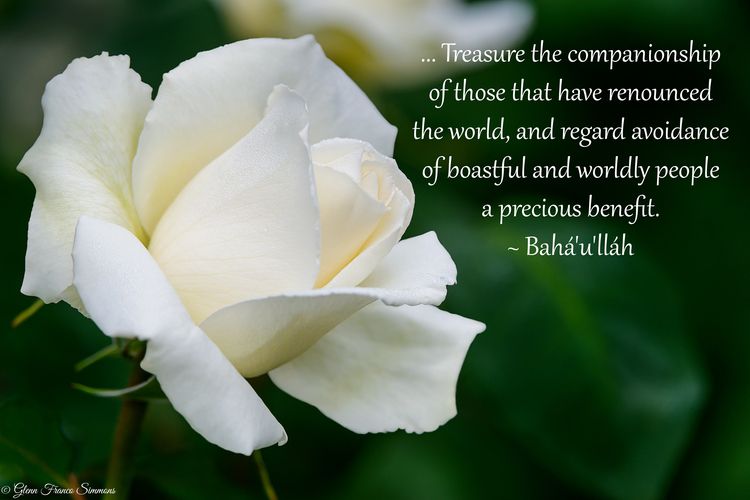Worship, a cornerstone of spiritual life, emerges as an intricate tapestry woven from threads of intention, devotion, and community. Within the Bahá’í framework, worship transcends mere ritual; it beckons individuals to engage in a dynamic relationship with the Divine. At the heart of Bahá’í teachings lies the understanding that true worship permeates all aspects of life, inviting believers to transcend the mundane and embark on a journey of spiritual awakening.
To explore what it means to worship from a Bahá’í perspective, one must grapple with the notion of intentionality. The act of worship begins with a conscious decision to connect with a higher power, to recognize and revere the Divine Creator. This consciousness is not confined to formal practices; rather, it is an all-encompassing awareness that fosters the recognition of the divine presence in every moment. One may ask, how does this shift in perception affect daily life? The answer lies in the transformative power of intentionality. When believers anchor their actions in a spirit of worship, ordinary moments become extraordinary manifestations of devotion.
Moreover, Bahá’í teachings emphasize the significance of universal principles in worship. While individual expressions vary, the essence remains rooted in unity. The Bahá’í Faith advocates for collective worship, where the congregational experience amplifies individual devotion. This communal aspect serves as a powerful reminder that strength lies in diversity. When Bahá’ís gather for prayer, they create a harmonious chorus of voices that elevates their collective spirit, fostering an environment conducive to inspiration and growth.
In addition to unity, one must consider the role of prayer and meditation as vital instruments of worship. Bahá’í writings extol the virtues of these practices, revealing them to be conduits through which believers can draw nearer to God. The act of prayer is not merely an expression of desire; it is a profound dialogic exchange. Through heartfelt supplication, individuals unlock the doors of their innermost selves, allowing divine light to permeate their being. The mere engagement in structured prayers becomes an undertaking of profound significance, as it cultivates a deeper awareness of one’s spiritual needs and aspirations.
The practice of meditation complements prayer, offering an opportunity for reflection and contemplation. In the stillness of meditation, believers can attune themselves to the whispers of the Divine, facilitating an intimate communion with God. This sacred time spent in reflection not only fortifies personal conviction but also engenders a sense of gratitude and wonder for the blessings bestowed upon them. The fusion of prayer and meditation becomes a dynamic interplay, propelling individuals toward spiritual maturity.
Worship in the Bahá’í Faith extends beyond the personal realm, intertwining with the ideals of service and action. True worship manifests when believers heed the divine call to contribute to the betterment of humanity. Acts of service are elevated to a form of worship, reinforcing the interconnectedness of all souls. This perspective compels Bahá’ís to see their work in the world as an extension of their devotion, embodying the principle that serving others is tantamount to serving God. Thus, the distinction between devotional life and societal engagement blurs, underscoring the integrated nature of worship.
It is essential to reflect on the concept of ‘worship through action.’ This principle illuminates the myriad ways in which believers can express their devotion through their daily lives—whether through justly fulfilling professional responsibilities, fostering positive relationships, or advocating for social justice. Each action imbued with intention transforms mundane tasks into embodiments of divine service. The realization that daily actions can constitute a form of worship invites curiosity. How might one approach the day-to-day responsibilities with a renewed sense of purpose? Each task—be it washing dishes, attending meetings, or caring for others—may indeed offer opportunities for spiritual engagement.
The Bahá’í perspective on worship further encourages believers to cultivate virtues as a pivotal aspect of their spiritual journey. Virtue is seen as the pathway that leads to divine proximity, and worship, in this light, becomes an exercise in character development. Love, compassion, honesty, and humility are not merely ideals to be admired but are intrinsic to the fabric of worship. Through the intentional cultivation of virtues, individuals draw closer to the Divine, transforming themselves into vessels of light that can illuminate the world around them.
Ultimately, the Bahá’í understanding of worship posits that the soul’s yearning for connection with God is an unquenchable thirst—one that unravels in the pursuit of knowledge, virtue, and service. This pursuit should invigorate believers to continually assess and refine their worship practices, ensuring that they remain vibrant and relevant. Worship must be a living, breathing expression of one’s spiritual journey, evolving alongside the individual as they undergo personal transformation.
As individuals embark on the sacred path of worship, a profound shift in perspective occurs. There is an awakening to the importance of sincerity, unity, and action. Bahá’í teachings invite followers to gaze beyond the rituals and embrace a holistic conception of worship that infuses daily life with purpose and meaning. In cultivating this expansive view, believers are blessed with the promise of a rich spiritual experience, one that not only deepens their connection with the Divine but also propels them toward the ultimate goal of service to humanity. Through worship, Bahá’ís find their place in the grand tapestry of existence, woven into the fabric of the universe through love, unity, and service.
